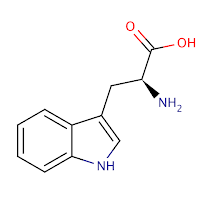Pardoxical: L-tryptophan Supplementation Increases Time to Exhaustion
 |
| Molecular structure of l-tryptophan (HMDB v2.5) |
The total exercise time was 49.4% greater after receiving L-tryptophan than after receiving the placebo. A lower rate of perceived exertion was exhibited by the group while on tryptophan although the differences from the control group were not statistically significant. No differences were observed in the other parameters between the two trials.The scientists conclude that the increase in serotonine lead to a concomitant increase in pain tolerance allowing the subjects who received l-tryptophan to cycle longer than the placebo-supplemented control group. If strength athletes and bodybuilders may benefit from l-tryptophan, as well, is however questionable. Exercising at 50% of ones VO2max is well-known to be a mind game. Weight lifting, on the other hand, is not so much about cumulating, but rather about immediate exhaustion; without corresponding research I will rather refrain from jumping into any conclusions.


